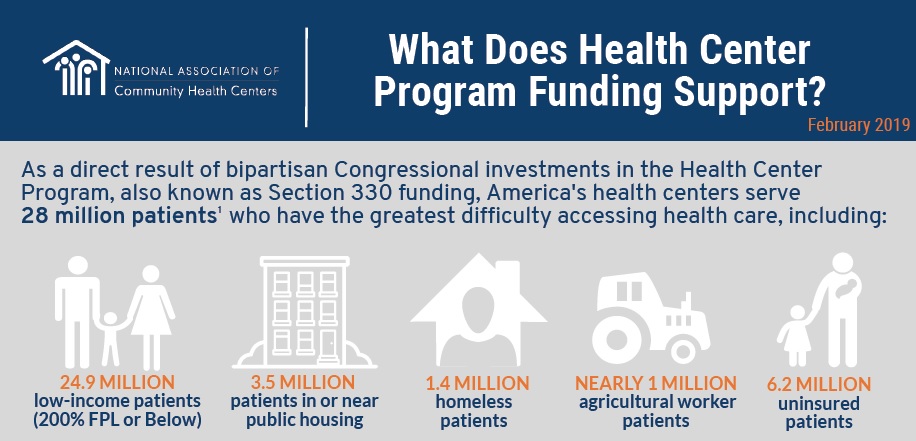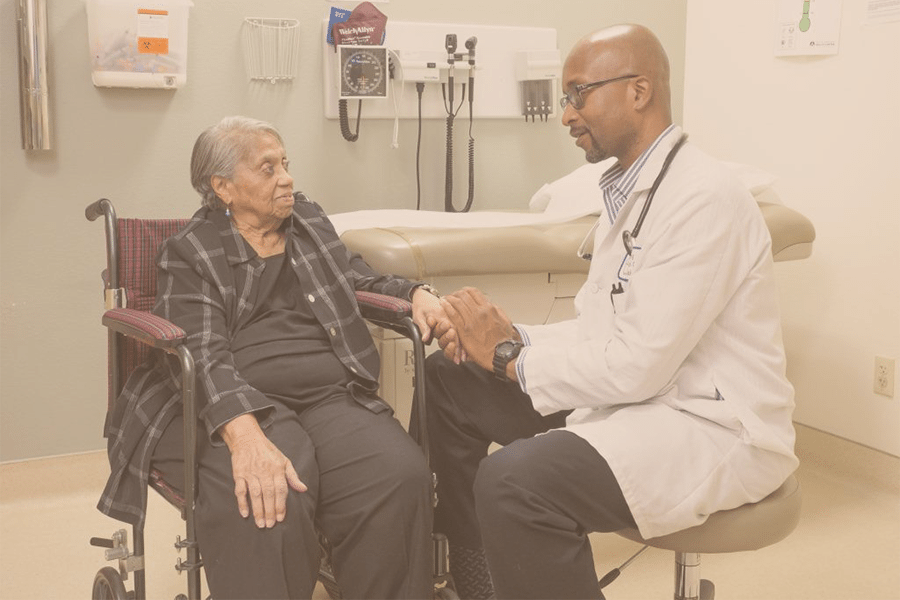IMPROVE ACCESS TO TO HEALTH CARE BY SUPPORTING COMMUNITY HEALTH CENTERS (CHCS)
UPDATE – Fight for Federal Health Center Funding Continues
The extension of mandatory health center funding goes through May 22,2020. The short-term spending bill will extend funding for the CHCF, the NHSC and the THCGME. While Congress was unable to pass a long-term extension by the end of September, the fact that all three programs were included in this short-term patch is a strong signal of Congress’ support for health centers.
Click here to read more about Congress’ effort to extend mandatory and discretionary funding for health centers.
Federal grant funding for Community Health Centers come from two sources:
- $1.63 billion in annual discretionary appropriations
- $4 billion in the Community Health Centers Fund (CHCF) which is set to expire on May 22, 2020 without Congressional action

Community Health Centers are non-profit clinics that provide primary care, dental care, behavioral health, and pharmacy services in diverse settings ranging from rural areas to urban centers. Currently, there are 1,400 of these safety-net providers operating in over 11,000 communities across the United States and its territories. The nation’s Community Health Centers serve approximately 28 million Americans, predominantly from low income and vulnerable backgrounds. In fact, Community Health Centers treat one in five uninsured Americans, a third of those living in poverty, and one in six Medicaid beneficiaries. Community Health Centers provide high quality, cost-effective care that annually saves the health care system an estimated $24 billion by reducing the need for patients to seek care in costlier settings such as emergency departments. Community Health Centers are a cost-effective solution to America’s health care challenges.
Historically, Congress has voted on an overwhelmingly bipartisan basis to extend both of these funding streams, which support health center operations, care for the uninsured, and the cost of services (such as translation, transportation, health education) not typically covered by insurance. Without action from Congress, health centers face a devastating cuts in grant funding.
Federal Grant Funding:
The primary form of federal funding for community health centers is the Health Center Program, which is authorized in Section 330 of the Public Health Services Act.
Read More
More commonly known as the “330 Grant,” funding for the Health Center Program comes from a combination of discretionary funding, appropriated by Congress each year, and mandatory funding from the Community Health Center Fund (CHCF).
More Info HERE.
330 Statute
Section 330 of the Public Health Service Act is the section of federal statute that creates and authorizes the Health Center Program. It gives the Bureau of Primary Health Care (BPHC) the authority to make grant awards to eligible entities and outlines the requirements that health centers must meet in order to be eligible for these awards. Health center look-alikes are also subject to these requirements.
More Info HERE.
State Funding:
State-level investments in health centers, in combination with federal funding, are rapidly becoming more important as health centers face rising medical costs and an increasingly complex health care system.
Read More
Currently, over half of all states provide some level of direct funding for health centers. According to NACHC’s 2018 PCA State Environment Assessment, 29 states provided direct state funding to FQHCs in FY2018. State funding can help health centers expand access to care to communities in need, increase outreach and enrollment initiatives, train health professionals, invest in building and supplies, and cover the costs of uncompensated care.
More info HERE.
What’s next for health center funding in Congress? Find out HERE.
